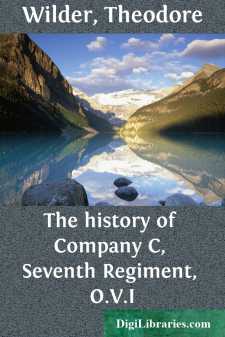Categories
- Antiques & Collectibles 13
- Architecture 36
- Art 48
- Bibles 22
- Biography & Autobiography 813
- Body, Mind & Spirit 142
- Business & Economics 28
- Children's Books 17
- Children's Fiction 14
- Computers 4
- Cooking 94
- Crafts & Hobbies 4
- Drama 346
- Education 46
- Family & Relationships 57
- Fiction 11829
- Games 19
- Gardening 17
- Health & Fitness 34
- History 1377
- House & Home 1
- Humor 147
- Juvenile Fiction 1873
- Juvenile Nonfiction 202
- Language Arts & Disciplines 88
- Law 16
- Literary Collections 686
- Literary Criticism 179
- Mathematics 13
- Medical 41
- Music 40
- Nature 179
- Non-Classifiable 1768
- Performing Arts 7
- Periodicals 1453
- Philosophy 64
- Photography 2
- Poetry 896
- Political Science 203
- Psychology 42
- Reference 154
- Religion 513
- Science 126
- Self-Help 84
- Social Science 81
- Sports & Recreation 34
- Study Aids 3
- Technology & Engineering 59
- Transportation 23
- Travel 463
- True Crime 29
The history of Company C, Seventh Regiment, O.V.I
by: Theodore Wilder
Description:
Excerpt
The History of Company C is properly connected with the history of Oberlin College, the Alma Mater of its organization. The majority of its members were proud to be known as the exponents of the generous, Christian principles, there so fearlessly uttered and so zealously inculcated. The founders of Oberlin were pledged to the general law of benevolence. All known forms of virtue were cheerfully adopted. Every system of wrong was deprecated.
Patriotism and the doctrine of Anti-Slavery very naturally found a place in the category of their principles. They seemed to be men, "clothed and in their right mind," possessing at least the ordinary balance of moral character, without any design to establish an institution for the purpose of waging war against any particular system of iniquity to the exclusion of all the others. Missionary associations, temperance and anti-slavery societies, in short, all organizations designed to aid in improving and saving their fellow men, found fearless advocates in them. Under the stimulus of such principles they left their pleasant homes in New England for residences in an unfavorable place in a forest of Ohio, to found a college that might prove a blessing to the broad West.
Oberlin College.The peculiar views held by Oberlin people with regard to their relations and duties to the government, which are commonly known as the doctrine of the Higher Law, were but the natural outgrowth of Christian benevolence. They saw slavery to be a great crime, and they were bold to take a stand against it, as one of their Christian duties. From the day that the question of the evil of slavery was brought before the country, they hesitated not to engage in the irrepressible conflict.
Multitudes of young men from the most virtuous families of the various States of the Union gathered into the College to educate themselves for positions of usefulness in every direction,—not all to be temperance lecturers, not all to be honest lawyers, virtuous physicians, radical anti-slavery enthusiasts; but some to fill all the various positions of honor and trust.
No argument need be made to prove the vast extent of influence for good which the College has exerted through the multitudes of young men who have gone out from her halls, bearing the precious seed with them. It has been scattered over the North, and to some extent over the South. And to-day we are permitted to see the fields whitening, though not fully ripe. The most enlightened communities, instead of receding from the views promulgated by Oberlin teachers, have rapidly approached them.
The majority of the students of the College were those who had been reared under good influences at home, and who found upon their arrival at Oberlin, that the views entertained by the people and taught by the Faculty were similar to their own. When the first military company was formed from them, the members represented not simply Oberlin College, but also the Christian families in which they had been trained. And so they all felt. Each was proud to offer himself to defend the principles his praying mother had taught him.
The news of the attack on Fort Sumter, by a rebellious force in arms, was received by the students with a sad enthusiasm. From the morning recitation, they would make haste to the Reading Room to learn the latest item of intelligence in the Daily, with regard to the progress of what then seemed the Insurrection.
The Enlistment....

